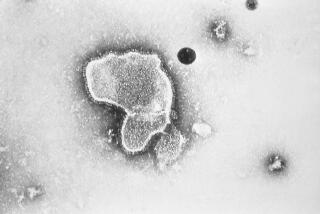Research Progresses for Vaccines Against Food-Borne Diseases
- Share via
World travelers understandably might wish for a single pill or shot to provide afford head-to-toe immunization against all the diseases that could afflict them.
But that’s a tall and unlikely order, say people working in vaccine development, a painstaking and tedious process that takes years. And even the best vaccine can’t guarantee total protection.
For the record:
12:00 a.m. May 19, 2001 FOR THE RECORD
Los Angeles Times Saturday May 19, 2001 Home Edition Part A Part A Page 2 A2 Desk 1 inches; 27 words Type of Material: Correction
Healthy Traveler--A May 13 story in the Travel section (“Research Progresses for Vaccines Against Food-Borne Diseases”) said malaria was a disease caused by a virus; it is caused by a parasite.
For the Record / Healthy Traveler
Los Angeles Times Sunday May 27, 2001 Home Edition Travel Part L Page 2 Travel Desk 1 inches; 21 words Type of Material: Correction
A May 13 story (“Research Progresses for Vaccines Against Food-Borne Diseases”) said malaria is a disease caused by a virus; it is caused by a parasite.
“All the easy vaccines have been made,” says Dr. Robert Edelman, associate director for clinical research at the University of Maryland’s Center for Vaccine Development and director of the Travelers’ Health Center at the university. Immunization can protect against several diseases, Edelman says, citing as examples measles, yellow fever, Japanese encephalitis, hepatitis A and B, and rabies.
The search is on for vaccines for the trickier diseases and to improve existing vaccines, sometimes by developing them in oral form, making injections unnecessary.
There is no vaccine for traveler’s diarrhea, for instance. Although it’s rarely life-threatening, this ailment can ruin a trip. Until now, prevention has depended on travelers in risky countries avoiding the primary routes of transmission: tap water, ice, and food that’s easily contaminated.
Besides diarrhea, symptoms can include cramping, mild fever and vomiting. Dehydration can set in; antibiotics and fluids are the common treatments.
Now researchers are testing oral vaccines. One being studied at Johns Hopkins University School of Hygiene and Public Health in Maryland targets E. coli, one of the common pathogens involved in the disease. The vaccine trial is being conducted with volunteers at two language schools in Mexico and Guatemala. So far, 900 people have participated, and the vaccine might be on the market in two years, says a spokeswoman.
Soon a combination vaccine may be available in the U.S. to protect against the potentially fatal liver diseases hepatitis A, which is transmitted by person-to-person contact or the ingestion of contaminated water or food, and hepatitis B, which is spread mainly through sexual activity.
Currently, separate vaccines are available for each type. GlaxoSmithKline, the maker of TwinRix, the combination vaccine, is awaiting marketing approval in the U.S. from the Food and Drug Administration. It’s on the market overseas.
A new oral vaccine for cholera, an acute intestinal infection transmitted by contaminated food and drink, vaccine may be on the horizon in the U.S. The cholera vaccine used now is only about 50% effective, according to the federal Centers for Disease Control and Prevention.
Vaccines for malaria and dengue fever are under development but not expected to be on the market for several years, Edelman says. Making a vaccine for malaria, a viral disease transmitted by mosquitoes, is especially complicated because four viruses are thought to cause the disease. Dengue fever, also spread by mosquitoes, is usually benign--except when it occurs as dengue hemorrhagic fever, which can be fatal.
Studies continueing on an oral vaccine for typhoid, a life-threatening illness caused by a bacterium transmitted by contaminated food or water. The current vaccines against this disease are only about 50% to 80% effective, according to the CDC. And they do not protect children.
A new injectable vaccine against typhoid has been found 90% effective for 2-to 5-year-olds in tests reported last month in the New England Journal of Medicine.
Edible vaccines--they’re often placed in slices of potato--continue to be studied. Among them, says Edelman says, is a hepatitis B vaccine that is not expected to be more effective than the present vaccine, but is more palatable than an iain innjection.
Even the best vaccine doesn’t cancel the need for precautions, such as avoiding contaminated food and drink and unsafe sex, travel health experts say.
*
For more information, visit the CDC Web site, https://www.cdc.gov.
*
The Healthy Traveler appears on the second and fourth Sundays.
More to Read
Sign up for The Wild
We’ll help you find the best places to hike, bike and run, as well as the perfect silent spots for meditation and yoga.
You may occasionally receive promotional content from the Los Angeles Times.






